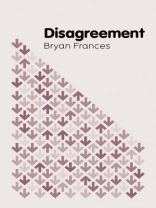Regardless of who you are or how you live your life, you disagree
with millions of people on an enormous number of topics from
politics, religion and morality to sport, culture and art. Unless
you are delusional, you are aware that a great many of the people
who disagree with you are just as smart and thoughtful as you are –
in fact, you know that often they are smarter and more informed.
But believing someone to be cleverer or more knowledgeable about a
particular topic usually won’t change your mind. Should
it?
This book is devoted to exploring this quandary – what should we do
when we encounter disagreement, particularly when we believe
someone is more of an authority on a subject than we are? The
question is of enormous importance, both in the public arena and in
our personal lives. Disagreement over marriages, beliefs,
friendships and more causes immense personal strife. People with
political power disagree about how to spend enormous amounts of
money, about what laws to pass, or about wars to fight. If only we
were better able to resolve our disagreements, we would probably
save millions of lives and prevent millions of others from living
in poverty.
The first full-length text-book on this philosophical topic,
Disagreement provides students with the tools they need to
understand the burgeoning academic literature and its (often
conflicting) perspectives. Including case studies, sample questions
and chapter summaries, this engaging and accessible book is the
perfect starting point for students and anyone interested in
thinking about the possibilities and problems of this fundamental
philosophical debate.
Table of Content
List of Stories
Introduction
Part 1: Basics of Disagreement
1. Genuine vs. Illusory Disagreement
2. Easier Questions about Disagreement
3. Harder Questions about Disagreement
4. Expert Testimony and Higher-Order Evidence
5. Peers, Inferiors, and Superiors
6. Some Results
7. The Peer Rule and the Superior Rule
8. Disagreement over Facts, Values, And Religion
9. Disagreement over Beliefs vs. Actions
10. What We Should Believe vs. What We Actually Believe
11. Response to Disagreement vs. Subsequent Level Of Confidence
12. What It Means To Realize Disagreement
13. The Disagreement Question Refined
14. Disagreement with One vs. Disagreement with Many
15. Some More Results
16. Study Questions and Problems
Part 2: Conciliatory or Steadfast?
1. Introduction
2. Revising the Three Rules Of Thumb
3. Rethinking Judgments about Peers And Superiors
4. More Revision: Confidence Level vs. Evidence Level
5. When You Have No Idea Who is in the Better Position
6. Split Experts
7. Special Case: Religious Belief
8. Some Results
9. Questions on Uniqueness, Independence, and Peerhood
Uniqueness
Independence
Conditional Peers and Superiors
Feldman’s Questions
10. Does Disagreement Lead To Skepticism?
11. The Disagreement Question Revisited
12. Study Questions and Problems
Index
About the author
Bryan Frances is Professor of Philosophy at Fordham University












